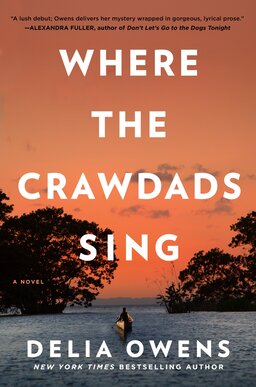“Where the Crawdads Sing” by Delia Owens
It’s been a while since I’ve read a novel I enjoyed as much as Delia Owen’s Where the Crawdads Sing. It’s a masterpiece of classic storytelling, although its plot is in most respects undistinguished. It’s a foundling story, a girl-meets-boy story, a broken-heart story, a coming of age story. All of which proves it’s all about how a writer tells the story. What really sets this one at the top of the heap for me is the fine writing. Every character, every scene comes to vivid life in my imagination because of the author’s carefully crafted sentences. I can see her slaving over these sentences, and paragraphs, bringing them to life, drawing them to ever higher levels of artistic description through, I imagine, endless revisions. At least that’s how it works for me.

Some of the tried-and-true themes that come to high narrative life are people who live in abject – and I mean abject – poverty in America. It was true in the 1960s, when the story is mostly set, and it’s still true today. There is a cruel, alcoholic father and a battered mother, both of whom have had their maturity interrupted by their misfortunes. We are introduced to Kya, abandoned not only by her parents but by her four older siblings as well, without a speck of concern for her. (I grimaced at the absurdity of her father warning her about “white trash.”) At eight years of age, living all by herself in the swamps (politely called marshes on the Outer Banks of North Carolina) and surviving only because of the mussels (“crying ‘cockles, mussels, alive – alive-o”) she sells. From the first pages, Kya occupies the tenderest portion of our hearts, which becomes increasingly important as this extraordinary coming-of-age story proceeds toward its unsettling conclusion.
As she enters her teen years, Kya learns how deeply the people of Barkley Cove (Gene Pitney’s “Town Without Pity”) despise her, simply because she disenfranchised from them. She doubles down on their resentment but then there are two boys interested in her and Kya doesn’t understand their primal wants any more than she understands her own. Whatever it is she needs, she barely recognizes it the desire to feel safe. As we read, we anticipate how certain occurrences will not go well for her, but we do not know how bad they can, and will, get. This keeps us turning the pages of this engrossing novel.
The author uses time shifts to great effect, allowing us to gain a deeper understanding of the people, places and events of Where the Crawdads Sing. Not only where, but why they sing. Her mother tells her, “Go as far as you can – way out yonder where the crawdads sing.” This is Kya’s tone-poem and a magnificent metaphor.
There were many, many instances where I loved and admired Delia Owens’s writing:
“. . .proving that imagination grows in the loneliest of soils . . .”
“. . .”the frayed knapsack, made of canvas tough enough for a lifetime and covered in small pockets and secret compartments.”
“The marsh’s soft air fell silklike around her shoulders. The moonlight chose an unexpected path through the pines, laying shadows about in rhymes.”
“She knew that no part of this yearning made sense. Illogical behavior to fill an emptiness would not fill much more. How much do you trade to defeat lonesomeness?”
You will surely find your own favorite passages.
And there is lovely poetry throughout, much of it written by the author under the nom de plume Amanda Hamilton. But it’s such a compelling story that I nearly didn’t want it to end! A story well told, elegantly told, rising like a Phoenix above the ashes of so much contemporary drivel that if you are an avid reader like yours truly, you’ll be inspired to seek out more extraordinary literary fiction like this. And if you’re a writer, you’ll want to raise the bar of your own storytelling to meet or exceed that of this first novel by Delia Owens.




